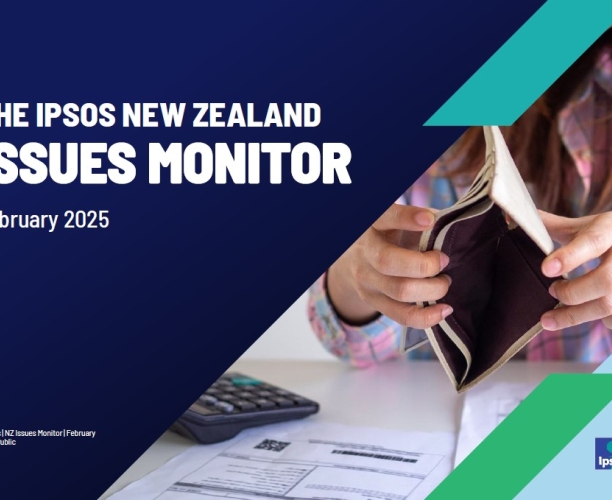

Ipsos New Zealand Issues Monitor - Feb 2025
New Zealand / Aotearoa, 21 March 2025 - The quarterly survey of 1,002 New Zealanders reveals that one in two consider inflation to be the most important issue. Healthcare follows as the second highest concern. The economy has risen to be the third most important issue, with one in three New Zealanders picking it in the top 3 issues facing the country, reaching the highest level since February 2021.
Key findings for the New Zealand market include:
- While inflation is still the primary concern for one in two New Zealanders, a statistically significant 5 percentage point drop, compared to the previous wave, suggests inflationary pressures are starting to ease for some people.
- Concerns around the economy continue to rise over the long-term reaching 30%, the highest level seen since February 2021.
- Issues change in importance across generations:
- While inflation is the primary concern for New Zealanders aged 18-49, those aged 65+ are significantly less likely to be concerned about this issue.
- Conversely, while healthcare emerges as the primary concern for those aged 50+, it ranks third and second respectively for those aged 18-34 and 35-49.
- Housing is the second most important issue for 18-34 age group and third for 35-40year olds.
- Crime is a relatively more important issue for those aged over 50.
- While political leaning has an impact on the perception of importance for multiple issues, both those intending to vote on the ‘left’ if there was an election tomorrow, and those intending to vote on the ‘right’ agree that inflation is the primary concern facing New Zealand with healthcare the second highest issue.
- Crime and the economy are of significantly higher concern to right-leaning voters.
- Left-leaning voters are more concerned about housing and poverty/inequality.
- The current coalition government received the lowest performance rating recorded since Ipsos began tracking the sentiment in 2018, with four in ten (41%) New Zealanders scoring it 0-3 out of 10. The performance rating of 4.2 is also significantly lower than the rating of 4.7 recorded in October last year.
- National continues to be seen as the political party most capable of handling three of the top five issues - Inflation, the economy and crime. However, public confidence in its ability to manage housing, immigration and transport issues has dropped since the previous wave. National is seen as being the most or equally capable of managing three of the remaining fifteen issues.
- Labour continues to hold public confidence in its ability to manage two of the top five issues – healthcare and housing and is perceived as being most or equally capable of tackling ten of the remaining fifteen issues.
- New Zealanders’ top five concerns are in line with our Australian counterparts, with both countries showing a similar level of concern for the economy and crime. More Australians are concerned about inflation than New Zealanders.
Carin Hercock, Country Manager, Ipsos New Zealand, said: “Despite two reductions in the official cash rate since Ipsos’ last measure of the issues concerning New Zealanders, inflation is still impacting the lives of New Zealanders as the most important issue for one in two. We have also seen no improvement in concerns about healthcare, which remains at a record high.”
Amanda Dudding, Executive Director Public Affairs, Ipsos New Zealand, added: “Money related issues are particularly difficult for younger New Zealanders, not only are they struggling the most with inflation and housing prices, but they are also more likely to be concerned about unemployment. For older New Zealanders, inflation is much less an issue, they have significantly higher concern with healthcare and our hospitals.”
Any further questions, please contact [email protected]



